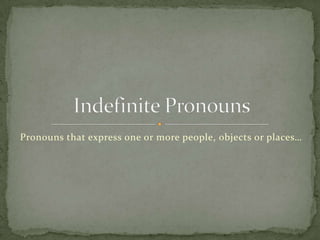
Indefinite pronouns
- 1. Pronouns that express one or more people, objects or places…
- 2. Indefinite pronouns are words which replace nouns without specifying which noun they replace. They can be singular , plural or both singular and plural !
- 3. Singular: another, anybody, anyone, anything, each, either, every body, everyone, everything, little, much, neither, nobo dy, no one, nothing, one, other, somebody, someone, somethi ng (any work that contains body, one or thing is singular!) Plural: both, few, many, others, several Singular or Plural: all, any, more, most, none, some
- 4. When using a singular indefinite pronoun, use singular verbs and singular personal and demonstrative pronouns. Correct: Each of the members has one vote. (The subject, each, is singular. Use has. A good way to check is to remove the prepositional phrase to ensure agreement.) Incorrect: One of the girls gave up their seat. Correct: One of the girls gave up her seat. (Her refers to one, which is singular.)
- 5. take plural verbs or plural personal pronouns and use plural verbs Correct: A few of the justices were voicing their opposition. (Few is plural, so are were and their.)
- 6. it depends on what the indefinite pronoun refers to. Correct: All of the people clapped their hands. (All refers to people, which is plural.) Correct: All of the newspaper was soaked. (Here all refers to newspaper, which is singular.)
- 7. In standard written English the possessive pronoun his is used to refer to a singular indefinite pronoun unless the group referred to is known to be all female. Incorrect: Is everyone happy with their gift? Correct: Is everyone happy with his gift? (Is and everyone are singular. The possessive pronoun must be singular, too)
- 8. Most languages, including English, observe the standard of using the masculine pronoun in situations like this. However, in some circles today the idea of choosing the masculine pronoun sounds discriminatory against women. If this usage bothers you, or if you think it may bother your audience, there are two possible ways to work around this and still use standard English. They are…
- 9. 1. Use the phrase his or her. It is a little awkward, but OK. Correct: Is everyone happy with his or her gift? 2. Rewrite the sentence using a plural pronoun or antecedent. Plural personal pronouns in English no longer distinguish between masculine and feminine. Correct: Are all the people happy with their gifts?